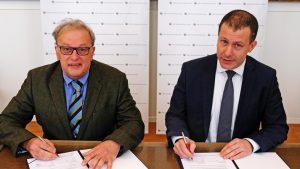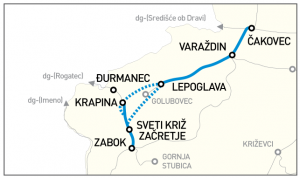 HŽ Infrastruktura and a consortium of ŽPD, Granova, Institut IGH and Rijekaprojekt signed a HRK 6.2 million (EUR 830,414) contract for the preparation of a study documentation on the creation of a railway link between Central Croatia functional region and Lepoglava junction.
HŽ Infrastruktura and a consortium of ŽPD, Granova, Institut IGH and Rijekaprojekt signed a HRK 6.2 million (EUR 830,414) contract for the preparation of a study documentation on the creation of a railway link between Central Croatia functional region and Lepoglava junction.
In 13 months, the preparation of the study documentation will be completed, which also includes the conceptual design, the feasibility study and cost-benefit analysis on the railway connection.
Within study documentation, environmental impact will be analysed as a basis for further documentation related to the development of the environmental impact study at the next design stage.
The project comprises the construction of the new Lepoglava – Krapina/ Sveti Križ Začretje line with a length of 19 km and the modernisation of 54 km between Čakovec and Lepoglava and Krapina/ Sveti Križ Začretje and Zabok. The line will be electrified and built for speeds of up to 160 km/ h.
The project is part of the modernisation and construction the needed railway infrastructure from Čakovec and Varaždin to Zabok and Zagreb.
The new Čakovec – Varaždin – Lepoglava – Zagreb line will allow shorter journey, with an estimated time-travel of 60 minutes, providing rail transport services for 300,000 inhabitants of northern Croatia to Zagreb.
 The project is in line with Croatia’s strategic goals for greater use of railway transport, connecting country’s agglomerations and the functional subregions. The new line is part of the regional Masterplan for Integrated Passenger Transport which envisages a better and faster access of the northern region to the Zagreb region and southern Croatia. The line is also an important link for freight transport, improving the competitiveness of northern Croatia’s economy.
The project is in line with Croatia’s strategic goals for greater use of railway transport, connecting country’s agglomerations and the functional subregions. The new line is part of the regional Masterplan for Integrated Passenger Transport which envisages a better and faster access of the northern region to the Zagreb region and southern Croatia. The line is also an important link for freight transport, improving the competitiveness of northern Croatia’s economy.
The contract is funded by the EU through the 2014-2020 Competitiveness and Cohesion OP with 85 per cent of eligible costs and by HŽ Infrastruktura with 15 per cent. The grant agreement for the development of study documentation was signed in December 2018. The EU provided a HRK 9.5 million (EUR 1.27 million) funding. The study development has a total value of HRK 13.9 million (EUR 1.8 million) and eligible costs of HRK 11.2 million (EUR 1.5 million).
Share on:



